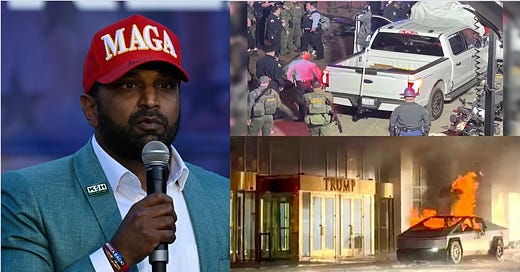New Year’s Attacks May Signal A Heightened Terrorism Threat Environment
This is no time to put an unqualified political operative in charge of the FBI
It is always risky to draw conclusions about acts of violence when the facts are still emerging, and the motivations of the attackers are likely never to be fully understood. However, the car-ramming attack that killed at least 15 civilians in New Orleans and the bizarre explosion of a Tesla Cybertruck outside a Trump hotel in Las Vegas suggest that we may be entering a period of increased political violence in the United States. Senators should keep this in mind as they consider Trump’s nominee for FBI Director, Kash Patel, whom his former supervisor in the first Trump administration described as “absolutely unqualified.”
The current FBI Director, Christopher Wray, has been warning for over a year about a heightened threat environment, citing factors such as the resurgence of ISIS-Khorasan (ISIS-K) in Afghanistan, outrage over civilian casualties from Israel’s offensive in Gaza, and Iran’s intent to seek revenge for various American and Israeli targeted killings. While there is no evidence that outside terrorist organizations orchestrated the New Year’s incidents, the New Orleans attack appears to be a “homegrown” attack by an American Muslim “inspired” by the radical Islamist ideology.
Research by my colleague Charles Kurzman and me over the past decade suggests that these homegrown attacks often increase during periods of successful activity by foreign terrorist organizations. When a group like ISIS-K conducts successful attacks or gains territory, as it has over the past 18 months, it can inspire individuals who sympathize with its ideology to take action. Successful groups also have the time and resources to flood the internet and social media channels with propaganda encouraging adherents to commit acts of violence. President Biden suggested yesterday that the New Orleans attacker may well have been inspired in this manner.
Although there is no public evidence to date linking the New Orleans attacker to Palestinian nationalism, we also should not underestimate the extent to which the extraordinary civilian death toll of Israel’s offensive in Gaza could inspire individuals to engage in terrorist violence inside the United States.
The Israel-Palestine conflict has long been a rallying cry for radical Islamists. Osama bin Laden frequently called on his adherents to take up arms against “the Judeo-Crusader alliance.” In a 2002 open “Letter to the American people,” bin Laden explicitly cited actions taken by Israel and its allies against Palestinians, noting that “the blood pouring out of Palestine must be avenged.” That letter recently gained traction on TikTok, where a journalist’s compilation of videos extolling bin Laden’s arguments garnered 38 million views and prompted TikTok to ban the hashtag #lettertoAmerica.
The conflict in Gaza has amplified this theme more than any other event since 9/11. For over 16 months, images and videos of bombings and suffering civilians have circulated like wildfire across the internet. Individuals sympathetic to the al Qaeda/ISIS ideology have been bombarded with what they see as evidence that bin Laden was right—the West believes “that Muslims’ blood is the cheapest and that their property and wealth is merely loot.” The framing of what has transpired in Gaza as “genocide” also stokes moral outrage that experts believe can push mere ideologues toward violence. Unlike during ISIS’s territorial rise, when hundreds of American sympathizers traveled abroad to support the cause, Israel’s control over the Gaza border precludes this form of activism. Under these circumstances, terrorist groups’ overt appeals urging the Muslim diaspora to act may be effective in stimulating more homegrown attacks as we saw yesterday in New Orleans.
The Cybertruck explosion in Las Vegas is a reminder that our domestic political environment continues to be unstable following Trump’s election. While the attack may have been perpetrated by a mentally impaired individual without a political agenda, it also could be an act of political violence directed against the Musk/Trump merger. This could be an early signal of deep discomfort with the union of technology-generated mega-wealth with governmental power that we have witnessed in this election. Political fissures emerged last week between the MAGA faithful and the tech billionaires over H-1B visas. More are sure to come.
All of this is good reason to be deeply concerned about Trump’s nomination of Kash Patel to lead the FBI, the chief agency responsible for preventing terrorism inside the United States. I oppose the Patel nomination on numerous grounds, and I hope many Senators do as well. But for those inclined to defer to Trump on this nomination, the New Year’s violence should give them pause. Former Attorney General William Barr’s response to Trump’s desire to insert Patel as the Deputy Director of the FBI during the first administration—“over my dead body”—speaks volumes about the risks of this appointment. The FBI has serious responsibilities, and its leadership makes life-or-death decisions. Disrupting and destabilizing this agency, diminishing its authorities, and diverting the agency from its core responsibilities, as Patel has proposed to do, cannot possibly enhance the agency’s effectiveness in the difficult task of preempting acts of terrorism.
If homegrown terrorism incidents escalate during Trump’s presidency, voters may well be asking—“Who put this guy in charge?”





I am so glad you have resumed writing Perilous Times. Your messages are insightful and welcome.